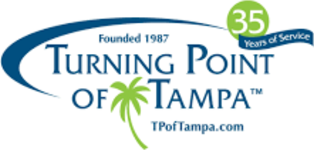






Turning Point of Tampa
Verified Center
This provider's information has been quality-checked by Recovery.com's Research Team for accuracy and completeness, including center verification through appropriate third-party organizations.
Treatment Focus
This center treats substance use disorders and co-occurring mental health conditions. Your treatment plan addresses each condition at once with personalized, compassionate care for comprehensive healing.
Primary Level of Care
Offering intensive care with 24/7 monitoring, residential treatment is typically 30 days and can cover multiple levels of care. Length can range from 14 to 90 days typically.
Treatment Focus
This center treats substance use disorders and co-occurring mental health conditions. Your treatment plan addresses each condition at once with personalized, compassionate care for comprehensive healing.
Primary Level of Care
Offering intensive care with 24/7 monitoring, residential treatment is typically 30 days and can cover multiple levels of care. Length can range from 14 to 90 days typically.
Provider's Policy
Turning Point of Tampa is committed to providing residential, day/partial, and intensive outpatient treatment. Turning Point of Tampa is an in-network provider with most major insurance carriers.
Turning Point of Tampa
Turning Point of Tampa
About Turning Point of Tampa
Since 1987, Turning Point of Tampa has been treating clients with addiction, eating disorders, and co-occurring disorders in the Tampa Bay area. Turning Point of Tampa provides a thorough assessment before clients start treatment, so they can create a personalized care plan.
Multiple Levels of Care
Turning Point of Tampa offers medical detox, residential care, day treatment (partial hospitalization), and intensive outpatient care (IOP). Based on client needs, clients can begin their journey to recovery at whatever level is most appropriate.
Comprehensive Treatment
Turning Point of Tampa’s doctors, therapists, and nurses staff strive to provide top-notch treatment. Clients participate in evidence-based therapies such as cognitive behavioral therapy (CBT), dialectical behavioral therapy (DBT), and motivational interviewing. Turning Point of Tampa emphasizes holistic healing and offers expressive arts therapy and equine therapy as part of this approach. Clinical staff take a trauma-informed approach and utilize trauma therapies, like narrative therapy and psychodrama, to help clients with co-occurring mental health issues. Clients in their eating disorder program focus on nutrition education, creating meal plans, and identifying triggers.
Long-Lasting Recovery
As a family-owned facility, Turning Point of Tampa works closely with helping the whole family heal. They offer a weekly family support group that provides addiction education and an opportunity for family members to process with others who have been through a similar situation. Turning Point of Tampa’s Resolve treatment program helps active-duty military and veterans recover. This program focuses on treating issues such as substance use disorders, chronic pain, trauma, unstable housing, and suicide. All alumni of Turning Point of Tampa are welcome to attend weekly aftercare groups for life at no additional cost.
Comfortable Housing
Turning Point of Tampa offers both private and semi-private rooms. All client houses have cable television, telephones, full kitchens, and laundry facilities within the apartment. Clients can enjoy on-site yoga, acupuncture, volleyball and basketball courts, and off-site activities.

Highlights from the Center
Highlights
These highlights are provided by and paid for by the center.
Joint Commission Accredited
Holistic Approach
30+ Years in Business
Eating Disorders Program
Center Overview
Treatment Focus
This center treats substance use disorders and co-occurring mental health conditions. Your treatment plan addresses each condition at once with personalized, compassionate care for comprehensive healing.
Joint Commission Accredited
The Joint Commission accreditation is a voluntary, objective process that evaluates and accredits healthcare organizations (like treatment centers) based on performance standards designed to improve quality and safety for patients. To be accredited means the treatment center has been found to meet the Commission's standards for quality and safety in patient care.
Insurance Accepted
Cash Pay Rates
Estimated Cash Pay Rate
Center pricing can vary based on program and length of stay. Contact the center for more information. Recovery.com strives for price transparency so you can make an informed decision.
Meet Your Care Team

Dave Eustace
Professional Relations
CLC, CRSS

Donna McWilliams
Nursing Team Lead
LPN

Hardeep Singh
Medical Director
MD, FASAM

Jennifer Flansburg
Client Coordinator

Jon Jasper
Eating Disorder Program Manager
LMHC

Logan Chamberlin
Clinical Director
LMHC, CRRA

Meredith Knitch
Primary Therapist
LMHC

Peter Johnson
Executive Director
MBA

Stephanie Harvey
HR Director, Information Management, Privacy Officer, Client Advocate




Levels of Care







Your Care Options
Specializations
Alcohol
Using alcohol as a coping mechanism, or drinking excessively throughout the week, signals an alcohol use disorder.
Detox
Detox fully and safely removes toxic substances from the body, allowing the next steps in treatment to begin with a clean slate.
Co-Occurring Disorders
A person with multiple mental health diagnoses, such as addiction and depression, has co-occurring disorders also called dual diagnosis.
Drug Addiction
Drug addiction is the excessive and repetitive use of substances, despite harmful consequences to a person's life, health, and relationships.
Eating Disorders
An eating disorder is a long-term pattern of unhealthy behavior relating to food. Most people with eating disorders have a distorted self-image.
Heroin
Heroin is a highly addictive and illegal opioid. It can cause insomnia, collapsed veins, heart issues, and additional mental health issues.
Opioids
Opioids produce pain-relief and euphoria, which can lead to addiction. This class of drugs includes prescribed medication and the illegal drug heroin.
Post Traumatic Stress Disorder
PTSD is a long-term mental health issue caused by a disturbing event or events. Symptoms include anxiety, dissociation, flashbacks, and intrusive thoughts.
Residential
In a residential rehab program, patients live onsite, with access to daily treatment and 24-hour care. An average stay is 30-90 days.
Who We Treat
Older Adults
Addiction and mental health treatment caters to adults 55+ and the age-specific challenges that can come with recovery, wellness, and overall happiness.
Co-Occurring Disorders
A person with multiple mental health diagnoses, such as addiction and depression, has co-occurring disorders also called dual diagnosis.
Executives
Executive treatment programs typically directly support the needs of people who manage businesses and may provide flexible schedules and office space to allow work during treatment.
Young Adults
Emerging adults ages 18-25 receive treatment catered to the unique challenges of early adulthood, like college, risky behaviors, and vocational struggles.
Men and Women
Men and women attend treatment for addiction in a co-ed setting, going to therapy groups together to share experiences, struggles, and successes.
Midlife Adults
For adults ages 40+, treatment shifts to focus on the unique challenges, blocks, and risk factors of their age group, and unites peers in a similar community.
Mild Disabilities
Adults with mild physical or intellectual disabilities receive treatment catered to their specific needs in a safe and clinically supportive environment.
Approaches
Evidence-Based
A combination of scientifically rooted therapies and treatments make up evidence-based care, defined by their measured and proven results.
Holistic
A non-medicinal, wellness-focused approach that aims to align the mind, body, and spirit for deep and lasting healing.
Therapeutic Community
Therapeutic communities allow patients to contribute to the success and progress of their community, through healthy behaviors or even basic chores.
Twelve Step
Incorporating spirituality, community, and responsibility, 12-Step philosophies prioritize the guidance of a Higher Power and a continuation of 12-Step practices.
Therapies
1-on-1 Counseling
Patient and therapist meet 1-on-1 to work through difficult emotions and behavioral challenges in a personal, private setting.
Attachment-Based Family Therapy
ABFT is a trauma-focused therapy that teaches you to form healthy relationships by rebuilding trust and healing attachment issues formed in childhood.
Animal Therapy
Animals can inspire trust and self-worth. In this experiential therapy, guided interactions are used to improve social skills and emotion regulation.
Body Image Therapy
Therapists use cognitive behavior techniques to challenge how patients perceive their body and their worth, rewriting negative thoughts and attitudes.
Equine Therapy
Guided interactions with trained horses, their handler, and a therapist can help patients improve their self-esteem, trust, empathy, and social skills.
Life Skills
Teaching life skills like cooking, cleaning, clear communication, and even basic math provides a strong foundation for continued recovery.
Motivational Interviewing
Based on the idea that motivation to change comes from within, providers use a conversational framework to discover personalized methods for change.
Conditions We Treat
Anxiety
Anxiety is a common mental health condition that can include excessive worry, panic attacks, physical tension, and increased blood pressure.
Bipolar
This mental health condition is characterized by extreme mood swings between depression, mania, and remission.
Depression
Symptoms of depression may include fatigue, a sense of numbness, and loss of interest in activities. This condition can range from mild to severe.
Eating Disorders
An eating disorder is a long-term pattern of unhealthy behavior relating to food. Most people with eating disorders have a distorted self-image.
Post Traumatic Stress Disorder
PTSD is a long-term mental health issue caused by a disturbing event or events. Symptoms include anxiety, dissociation, flashbacks, and intrusive thoughts.
Substances We Treat
Alcohol
Using alcohol as a coping mechanism, or drinking excessively throughout the week, signals an alcohol use disorder.
Benzodiazepines
Benzodiazepines are prescribed to treat anxiety and sleep issues. They are highly habit forming, and their abuse can cause mood changes and poor judgement.
Chronic Relapse
Consistent relapse occurs repeatedly, after partial recovery from addiction. This condition requires long-term treatment.
Co-Occurring Disorders
A person with multiple mental health diagnoses, such as addiction and depression, has co-occurring disorders also called dual diagnosis.
Cocaine
Cocaine is a stimulant with euphoric effects. Agitation, muscle ticks, psychosis, and heart issues are common symptoms of cocaine abuse.
Drug Addiction
Drug addiction is the excessive and repetitive use of substances, despite harmful consequences to a person's life, health, and relationships.
Ecstasy
Ecstasy is a stimulant that causes intense euphoria and heightened awareness. Abuse of this drug can trigger depression, insomnia, and memory problems.
Heroin
Heroin is a highly addictive and illegal opioid. It can cause insomnia, collapsed veins, heart issues, and additional mental health issues.
Languages
Aftercare
Care Designed for Your Needs
Personal Amenities
Amenities
Special Considerations
Gender-specific groups
Patients in gender-specific groups gain the opportunity to discuss challenges unique to their gender in a comfortable, safe setting conducive to healing.
Activities
Yoga
Yoga is both a physical and spiritual practice. It includes a flow of movement, breathing techniques, and meditation.
Off-Site Activities
Off-Site Amenities
What people are saying
Treatment
4.3
Accommodations
4.3
Food & Nutrition
4.0
Value
4.3
Pros
- Supportive Aftercare (4)
- Beautiful Location (3)
- Friendly and Competent Staff (2)
- Family Program (2)
Erin B
Treatment in 2024 • (60 days) • Reviewed 03/01/24
Loved One of a Former Client
R.Battle
Treatment in 2024 • (45 days ) • Reviewed 03/07/24
Former Client
•West Palm Beach
BTK
Treatment in 2004 • (90 days) • Reviewed 03/06/24
Former Client
•NA
Debbie
Treatment in 2023 • (45 days ) • Reviewed 03/05/24
Former Client
•Melbourne
MEK
Reviewed 09/18/20
Review from Rehabs.com






